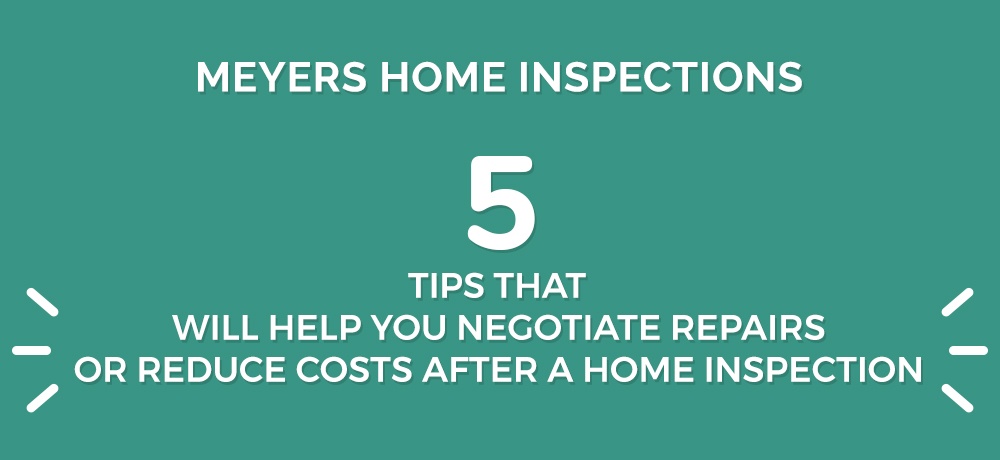Five Tips That Will Help You Negotiate Repairs or Reduce Costs After A Home Inspection

As a prospective homebuyer, you want a house that is fully functional and has less scope for damage and costly repair work. While a home inspection will give you a heads up of the components in your house that need to be fixed or replaced, issues will typically arise after an inspection. Once concerns have been brought to your attention, you will need to go through an inevitable part of a real estate transaction - the negotiation process!
To handle the negotiation of your home inspection repairs without losing the sale or purchase of a house, it is best to follow a few tips and tricks. To ensure you are prepared and come out top, Meyers Home Inspections has put together a list of five tips to help you negotiate repairs or reduce costs after a home inspection.
Tip #1: Stay focused on major repairs or potential expenses.
It’s important to prioritize which repairs are critical and which repairs can be put on the back-burner. For example, an old or non-functional heating system will result in a significant expense and is essential. On the other hand, minor damage to walls or minor scratches on floors are considered cosmetic, as they usually do not require costly repairs.
Tip #2: Test or evaluate every major item.
Sometimes, additional evaluations are needed to make sure everything is functional. Some examples include a central AC, which can’t be tested properly in cold weather, and buried sections of plumbing drain pipes. Outdated plumbing drain pipes can have hidden corrosion, clogs, and gaps. Also, if a house has been vacant for an extended period of time, it can be difficult to detect drainage clogs. In these cases, you should order a buried drain pipe scan from a specialty plumber to avoid costly drain pipe excavation.
Tip #3: Ask for credit for the work done.
If you’re buying a house, keep in mind that most sellers are occupied with shifting to a new house, and would generally prefer not to take the time to get any work done. Also, when sellers resolve repairs, they typically do the minimum job required. Unless a repair is essential for when you move in, you may want to get a credit for the repair at closing instead.
Tip #4: Pay attention to market conditions.
Be aware that market conditions can significantly influence what sellers will be willing to do. If a home has multiple offers, sellers may refuse to do any repairs or give any credits, even if significant defects were found during the inspection. In these cases, you can try to push for health and safety-related items, such as unsafe electrical conditions, the presence of asbestos materials, or hazardous garage door openers. Sometimes, they realize that it is in their interest not to sell their house with known hazards.
Tip #5: Take time to make a decision.
If many serious defects or defaults are found, and the seller does not agree to fix at least some of them, you have a decision to make. Before rushing into signing the contract, ask yourself a few questions - is the house still worth it? Will you have enough funds left over to have the items fixed yourself? Or should you walk away and look for a different home?
If you need a home inspector to determine whether your potential house needs repair work, reach out to the experts at Meyers Home Inspections. As an experienced home inspection company in South Orange, NJ, we ensure the highest standards of home inspection services. Our mission is to provide you with an accurate, unbiased assessment of the condition of the home you are buying. Our services include home inspections, commercial building inspections, as well as follow-up and specialty inspections. To learn more about the services that we provide, please click here or get in touch with us here for any information you need.